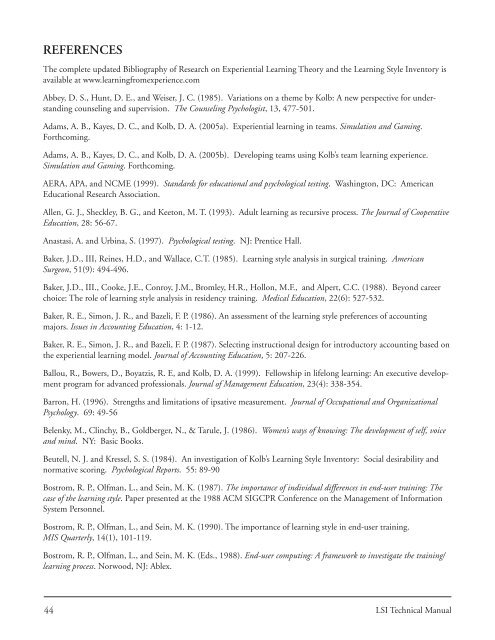The Kolb Learning Style Inventory—Version 3.1 2005 - Whitewater ...
The Kolb Learning Style Inventory—Version 3.1 2005 - Whitewater ...
The Kolb Learning Style Inventory—Version 3.1 2005 - Whitewater ...
You also want an ePaper? Increase the reach of your titles
YUMPU automatically turns print PDFs into web optimized ePapers that Google loves.
REFERENCES<br />
<strong>The</strong> complete updated Bibliography of Research on Experiential <strong>Learning</strong> <strong>The</strong>ory and the <strong>Learning</strong> <strong>Style</strong> Inventory is<br />
available at www.learningfromexperience.com<br />
Abbey, D. S., Hunt, D. E., and Weiser, J. C. (1985). Variations on a theme by <strong>Kolb</strong>: A new perspective for understanding<br />
counseling and supervision. <strong>The</strong> Counseling Psychologist, 13, 477-501.<br />
Adams, A. B., Kayes, D. C., and <strong>Kolb</strong>, D. A. (<strong>2005</strong>a). Experiential learning in teams. Simulation and Gaming.<br />
Forthcoming.<br />
Adams, A. B., Kayes, D. C., and <strong>Kolb</strong>, D. A. (<strong>2005</strong>b). Developing teams using <strong>Kolb</strong>’s team learning experience.<br />
Simulation and Gaming. Forthcoming.<br />
AERA, APA, and NCME (1999). Standards for educational and psychological testing. Washington, DC: American<br />
Educational Research Association.<br />
Allen, G. J., Sheckley, B. G., and Keeton, M. T. (1993). Adult learning as recursive process. <strong>The</strong> Journal of Cooperative<br />
Education, 28: 56-67.<br />
Anastasi, A. and Urbina, S. (1997). Psychological testing. NJ: Prentice Hall.<br />
Baker, J.D., III, Reines, H.D., and Wallace, C.T. (1985). <strong>Learning</strong> style analysis in surgical training. American<br />
Surgeon, 51(9): 494-496.<br />
Baker, J.D., III., Cooke, J.E., Conroy, J.M., Bromley, H.R., Hollon, M.F., and Alpert, C.C. (1988). Beyond career<br />
choice: <strong>The</strong> role of learning style analysis in residency training. Medical Education, 22(6): 527-532.<br />
Baker, R. E., Simon, J. R., and Bazeli, F. P. (1986). An assessment of the learning style preferences of accounting<br />
majors. Issues in Accounting Education, 4: 1-12.<br />
Baker, R. E., Simon, J. R., and Bazeli, F. P. (1987). Selecting instructional design for introductory accounting based on<br />
the experiential learning model. Journal of Accounting Education, 5: 207-226.<br />
Ballou, R., Bowers, D., Boyatzis, R. E, and <strong>Kolb</strong>, D. A. (1999). Fellowship in lifelong learning: An executive development<br />
program for advanced professionals. Journal of Management Education, 23(4): 338-354.<br />
Barron, H. (1996). Strengths and limitations of ipsative measurement. Journal of Occupational and Organizational<br />
Psychology. 69: 49-56<br />
Belenky, M., Clinchy, B., Goldberger, N., & Tarule, J. (1986). Women’s ways of knowing: <strong>The</strong> development of self, voice<br />
and mind. NY: Basic Books.<br />
Beutell, N. J. and Kressel, S. S. (1984). An investigation of <strong>Kolb</strong>’s <strong>Learning</strong> <strong>Style</strong> Inventory: Social desirability and<br />
normative scoring. Psychological Reports. 55: 89-90<br />
Bostrom, R. P., Olfman, L., and Sein, M. K. (1987). <strong>The</strong> importance of individual differences in end-user training: <strong>The</strong><br />
case of the learning style. Paper presented at the 1988 ACM SIGCPR Conference on the Management of Information<br />
System Personnel.<br />
Bostrom, R. P., Olfman, L., and Sein, M. K. (1990). <strong>The</strong> importance of learning style in end-user training.<br />
MIS Quarterly, 14(1), 101-119.<br />
Bostrom, R. P., Olfman, L., and Sein, M. K. (Eds., 1988). End-user computing: A framework to investigate the training/<br />
learning process. Norwood, NJ: Ablex.<br />
44 LSI Technical Manual


